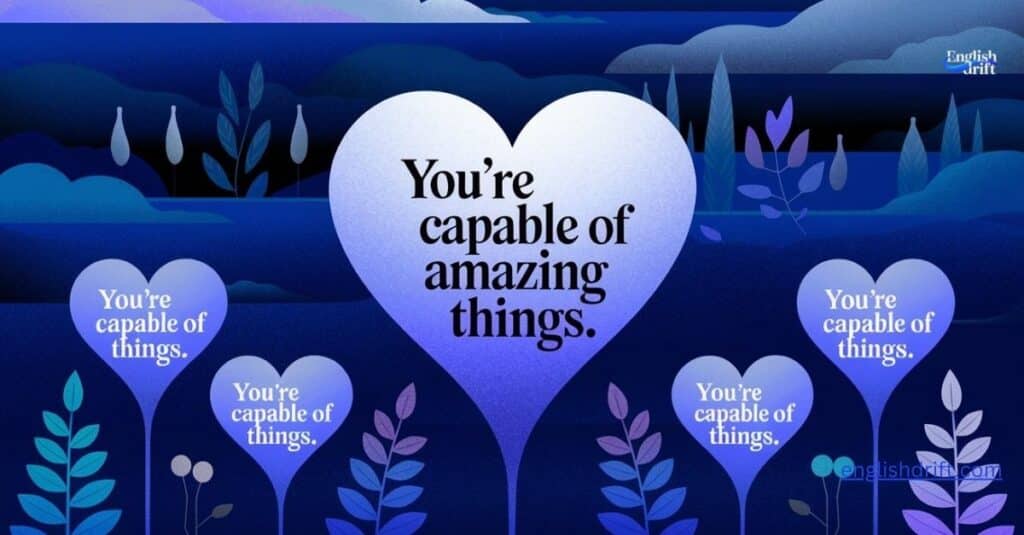We’ve all heard it before: “I believe in you.” It’s one of the most powerful phrases you can say to someone. But what if you need to express belief in someone without using the same words over and over again? Whether it’s in personal relationships, professional environments, or even casual conversations, saying “I believe in you“ using different terms can make a huge difference.
This article offers 17 alternatives to say “I believe in you,” while also diving into why such phrases matter, when to use them, and how they impact people. We’ll cover examples, tips, and even the deeper meaning behind using encouragement phrases.
Why Saying “I Believe in You” Matters
Saying “I believe in you” or its variations is much more than just a phrase. It’s an affirmation of trust, support, and confidence in another person’s abilities. The psychological boost this phrase offers is immense, making it one of the most significant things you can say to someone who’s working on a challenge or facing adversity.
READ MORE 19 Other Ways to Say “Sorry to Hear That” (With Examples)
Psychological Impact of Belief
Research shows that when someone feels that others believe in them, they’re more likely to perform better, feel more confident, and be more motivated. It taps into the human need for validation, encouraging the individual to persist even when obstacles appear. Verbal affirmations, especially those that show belief in someone’s abilities, have a lasting impact on self-esteem and success rates.
According to a study by Gallup, employees who feel supported by their managers perform better in tasks and exhibit higher motivation. It’s not just about the words themselves; it’s about expressing trust and belief in the person’s skills and potential.
Is It Professional to Say “I Believe in You”?
In professional environments, showing confidence in someone’s abilities is essential, but the phrase “I believe in you” may sometimes sound too personal or informal. However, that doesn’t mean encouragement phrases should be avoided. Instead, finding the right words for the right context is key.
Formal vs. Informal Settings
In the workplace, encouragement is crucial for motivation. That said, phrasing like “I know you’ll nail this” might be too casual during a formal review meeting, whereas “I’m confident in your abilities” strikes the perfect balance between professionalism and support.
A workplace report by Harvard Business Review indicates that when leaders express belief in their team members, employees are more likely to push boundaries, innovate, and exceed expectations.
READ MORE 17 Other Ways to Say “Nice to E-Meet You” (With Examples)
Navigating Professional Boundaries
While you might want to avoid overly sentimental language in a business setting, replacing “I believe in you” with other terms can create a professional yet uplifting atmosphere. For instance, in a project meeting, you might say:
- “I trust your expertise to lead this project.”
- “You’ve got all the skills needed to make this happen.”
Being clear, concise, and professional while encouraging someone can still send a message of belief in their capabilities.
How to Say I Believe in You Without Saying It Directly
There are countless ways to express belief in someone’s abilities without using the exact words “I believe in you.” The delivery matters, but so does tailoring the message to the recipient’s personality and context.
Tone and Delivery
The tone of your voice, body language, and context all contribute to how your message is received. Even the most well-meaning phrase can lose impact if said in a monotone or distracted manner. For example, saying “I trust you” while maintaining eye contact and smiling will resonate far more than a quick, offhand remark.
Personal vs. General Encouragement
Everyone responds differently to encouragement. Some prefer direct praise like “You’ve got this,” while others might appreciate a more subtle show of trust, like “I know you’ll handle this challenge well.“ Adjusting your wording to the individual can make your encouragement more meaningful.
17 Powerful Alternatives to Say “I Believe in You”
- I have faith in your abilities.
- I trust in your capabilities.
- I know you can do this.
- You have what it takes.
- I’m confident in your success.
- You’re going to excel at this.
- I’m behind you all the way.
- You have my full support.
- I have no doubt you’ll succeed.
- You’re capable of amazing things.
- Your skills speak for themselves.
- You’re a natural at this.
- I’m excited to see what you accomplish.
- You’re exactly the right person for this.
- I can see your potential.
- You’ve got this under control.
- I have no doubts about your abilities.
READ MORE “Oh Wow”: Best Responses 50+ Clever & Witty Comebacks
17 i believe other term (With Examples)
Here’s a list of 17 ways to express “I believe in you” without using the same phrase. Each alternative comes with an example to help you see when and how to use it effectively.
1. “I have faith in your abilities.”
This phrase emphasizes a strong belief in the person’s competence and skills. Use it when someone doubts their ability to achieve a task.
- Example: “I’ve seen how dedicated you are; I have faith in your abilities to get this done.”

2. “I trust in your capabilities.”
Using trust in this way conveys a deep level of confidence in the person’s abilities, particularly when they are faced with a difficult challenge.
- Example: “This is a tough project, but I trust in your capabilities to figure out the best solution.”
3. “I know you can do this.”
This is a straightforward, encouraging phrase that boosts confidence, often used right before someone embarks on a task or goal.
- Example: “Even though this seems overwhelming, I know you can do this and come out on top.”
- Example when you believe nothing except what you want to believe
4. “You have what it takes.”
This phrase emphasizes the individual’s innate talents and preparation, affirming that they already possess everything necessary to succeed.
- Example: “With your skills and experience, you have what it takes to excel in this role.”
5. “I’m confident in your success.”
Use this phrase when you want to express certainty that someone will achieve their goals, often in professional or personal milestones.
- Example: “Your dedication and hard work are clear; I’m confident in your success.”

6. “You’re going to excel at this.”
This phrase affirms the person’s ability to surpass expectations, making them feel capable of extraordinary achievements.
- Example: “Based on your past performance, I know you’re going to excel at this new challenge.”
READ MORE 50+ Roasts That Hurt And Rhyme
7. “I’m behind you all the way.”
This is a strong statement of support, showing the person that they won’t face challenges alone. It’s ideal in team settings.
- Example: “No matter what, I’m behind you all the way as you work through this challenge.”
8. “You have my full support.”
Offering your full support signals unwavering confidence in the person’s abilities and shows that you’ll assist in any way possible.
- Example: “Don’t hesitate to take bold steps—you have my full support in this endeavor.”
9. “I have no doubt you’ll succeed.”
This is a bold phrase, perfect for giving someone an extra push when they’re feeling insecure about a particular project or challenge.
- Example: “Given your talents, I have no doubt you’ll succeed with this proposal.”
10. “You’re capable of amazing things.”
Affirming someone’s potential, this phrase inspires them to dream big and believe in their ability to achieve extraordinary results.
- Example: “You’ve shown incredible skill already—you’re capable of amazing things.”

11. “Your skills speak for themselves.”
This acknowledges the person’s prior achievements and expresses that their competence is obvious to everyone around them.
- Example: “Your skills speak for themselves, and I trust you to handle this project perfectly.”
12. “You’re a natural at this.”
A great phrase to use when someone is effortlessly good at something, making them feel valued and appreciated for their talents.
- Example: “From the way you approach problems, it’s clear you’re a natural at this kind of work.”
13. “I’m excited to see what you accomplish.”
This anticipates future success, suggesting that the person’s work is not only reliable but bound to impress.
- Example: “Your creative ideas are always top-notch—I’m excited to see what you accomplish.”
14. “You’re exactly the right person for this.”
This expresses complete confidence in the individual’s ability to complete the task, often used to instill leadership qualities.
- Example: “You bring unique strengths to this role—you’re exactly the right person for this challenge.”
15. “I can see your potential.”
This phrase reinforces the idea that the individual has untapped abilities or skills that could help them achieve even greater success.
- Example: “You’ve already shown so much progress—I can see your potential to reach new heights.”

16. “You’ve got this under control.”
This reassures the person that they’re capable of handling any challenge or task ahead of them, and that there’s no need for anxiety.
- Example: “You’ve done all the necessary preparation—you’ve got this under control.”
17. “I have no doubts about your abilities.”
Another strong affirmation that shows you believe in someone’s competence and skills, without any reservations.
- Example: “There’s nothing you can’t handle—I have no doubts about your abilities to succeed.”
When to Use These Phrases
Encouraging others requires a balance of timing, context, and authenticity. Whether you’re in the workplace or dealing with personal relationships, knowing when to use these phrases is crucial for making the biggest impact.
Professional Settings
In professional settings, encouragement can come during moments of challenge, decision-making, or transition. For instance:
- Project Meetings: Use phrases like “I trust in your capabilities” or “I’m confident in your success” during project planning sessions.
- Performance Reviews: Consider saying “I can see your potential” to inspire team members during review cycles.
- One-on-One Check-Ins: Regularly offer reinforcement by saying, “You have what it takes,” especially when employees face tough challenges.
Personal Settings
In more personal environments, like relationships or friendships, uplifting words can have even greater resonance. You might say “I’m behind you all the way” to a close friend who’s facing a life challenge, or “You’re capable of amazing things” to a family member working toward a goal.
The key is to make sure that your message fits the moment and the person you’re addressing.
Tips for Encouraging Others Effectively
Encouragement phrases are most powerful when used effectively. Here are a few tips to make sure you’re providing the best possible support.
Be Genuine
Always mean what you say. Authenticity is crucial when using any variation of “I believe in you.” People can easily detect when praise feels insincere, and it can have the opposite effect if they sense you’re just going through the motions.
Tailor Your Language to the Person
Understanding the individual’s personality and preferences will help you choose the right phrase. For example, a more sensitive person might appreciate “I have faith in your abilities,” while a more independent individual might respond better to “I trust you to make this happen.”
Timing is Crucial
Encouragement is especially valuable when given at the right moment. Consider offering supportive phrases before a big presentation, after a setback, or during moments of self-doubt.
Table: Quick Reference for Professional and Personal Settings
| Professional Setting | Personal Setting |
|---|---|
| “I trust in your capabilities.” | “You’ve got this under control.” |
| “You have my full support.” | “I have no doubt you’ll succeed.” |
| “I know you can do this.” | “You’re a natural at this.” |
Conclusion: Encouragement is a Powerful Tool
Ultimately, saying “I believe in you”—or one of the 20 other variations—goes beyond simple words. It can have a profound effect on someone’s motivation, performance, and confidence. Whether in the workplace or personal life, offering encouragement shows that you trust in someone’s abilities and want them to succeed.
Next time you want to express trust and support, try one of these phrases. You might be surprised at just how much of a difference it can make.

Henry James is an experienced blogger at English Drift, specializing in English grammar and vocabulary. With a passion for language and clear communication, Henry helps readers enhance their writing skills through insightful guides and practical tips.







